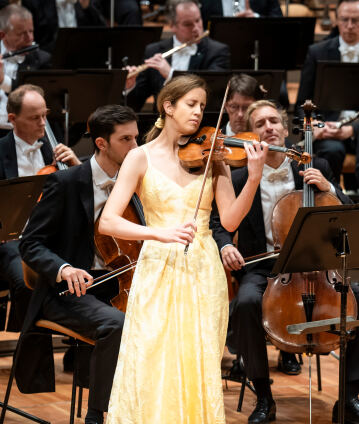Kirill Petrenko and Vilde Frang

At times melancholic and austere, at others with a dance-like lightness: Dvořák’s Seventh Symphony encompasses a broad spectrum of moods, infused with the colouring of Czech folk music. Kirill Petrenko also conducts Erich Wolfgang Korngold’s Violin Concerto with Vilde Frang as the soloist: a work that shows repeated flashes of the sparkling film music that the composer created for Hollywood. Rachmaninov’s mystical Isle of the Dead takes us into yet another sound world.
Following on from their performance of the great Symphony in F sharp, Kirill Petrenko and the Berliner Philharmoniker here present another of Korngold’s major works, the lavishly orchestrated, engaging, and skilfully crafted Violin Concerto from 1945. The composer used, among others, music from his soundtrack to the adventure film Anthony Adverse, for which he received one of his two Oscars. The solo part demands a robust tone and the display of a great wealth of colour – the perfect challenge for Vilde Frang, who has been a regular guest with the Philharmoniker since 2016.
Sergei Rachmaninoff was inspired by Arnold Böcklin’s painting of the same name for his melancholy and atmospheric tone poem The Isle of the Dead. As Kirill Petrenko explained in an interview, the work, whose unusual rhythm evokes the crashing of waves on the sea, is part of Russian turn of the century Symbolism.
Antonín Dvořák was an almost unknown composer until well into his thirties. His late fame initially spread across German-speaking countries before reaching the English-speaking world. His Seventh Symphony, for example, was commissioned by the Royal Philharmonic Society and premiered to great acclaim in London in 1885. Like the last symphonies by Beethoven and Bruckner, it is in D minor and is sometimes referred to as Dvořák’s “Tragic”. The composer’s characteristic abundance of melodies is embedded here in a captivating dramatic arc. It ranges from the sombre, foreboding opening to the pastoral slow movement, and from the dramatic scherzo to the conclusion in the finally achieved key of D major.
© 2024 Berlin Phil Media GmbH
Related interviews
Artists
Our recommendations
- Simon Rattle conducts the 2016 Europakonzert in Røros
- Iván Fischer and Vilde Frang present Bartók’s Violin Concerto No. 1
- Hannu Lintu and Vilde Frang
- Kirill Petrenko conducts Tchaikovsky’s “Mazeppa”
- 2023 Europakonzert from Barcelona with Kirill Petrenko
- Kirill Petrenko and Patricia Kopatchinskaja with Hartmann and Stravinsky